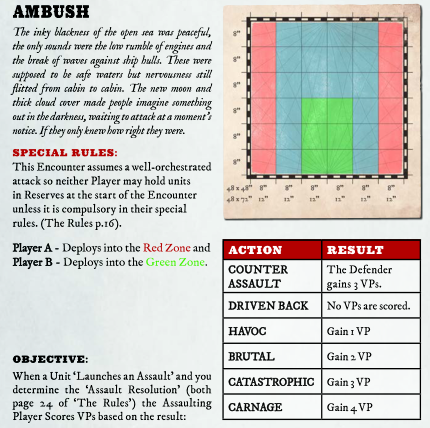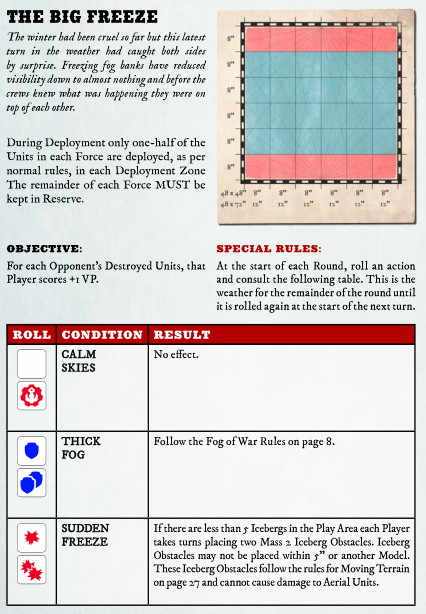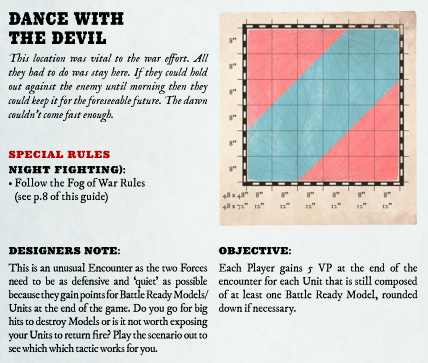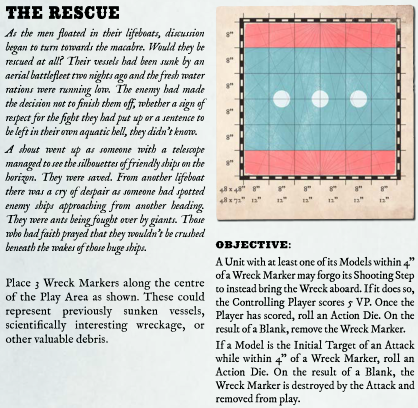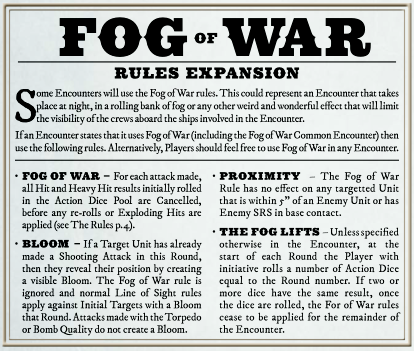Review - Dystopian Wars, 3rd Edition
2024-03-25
Dystopian Wars /
Review /
The Models
I played the Spartan Games version of Dystopian Wars a few times when it was in publication. I generally like naval games, and science fiction, so it appeals to me on a basic level. I initially disliked the renders of the new models, but after seeing some in person (Dr. Tree has a Commonwealth force, and there's a group that plays at my local) I changed my opinion. They're 'Heroic Scale' boats, exaggerated in a way that makes them slightly cartoonish in a web browser, but easily readable IRL on a table.
So I bought some Union ships, played a game or two, bought some more ships, built and painted terrain, and played a few more games still. Started painting the models though I'm currently stuck on how to get the shades of blue I want to not look like denim, but at least my decking and trim are good. You can see a patchwork of layers and colors all over the hull.
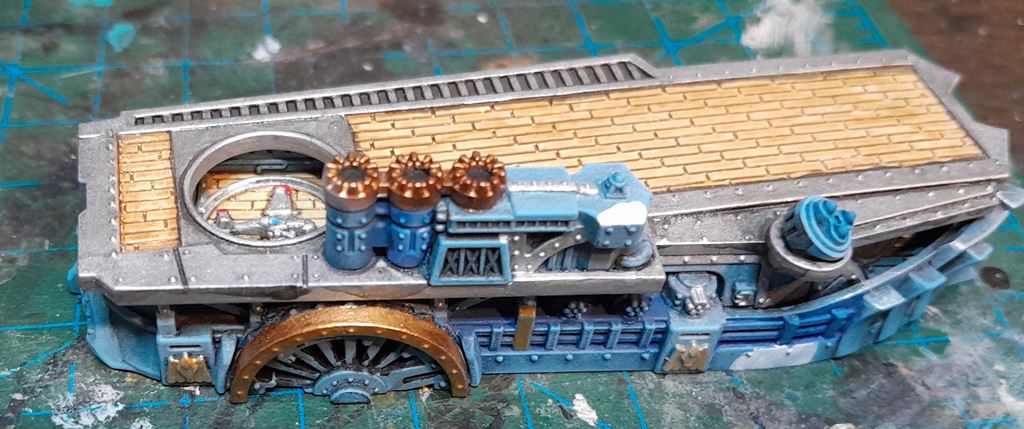
Anyways, I feel like I understand the game enough to write a coherent and informed opinion about it, so here goes.
Special Rules
It's got some extreme special ability bloat going. There's so many rules that are just slight variations of each other. 'Linear Dash' and 'Full Steam Ahead' are slightly different bonuses to movement for going straight. 'Infrasound Detector' and 'Hydrophone Relay' were "ignore
Even the rules that are wholly unique are wordy and there's sooooo many of them. Every unit has 6-12 special rules, though two of them are usually factional rules. It's hard to remember them all. Even the most veteran of players I play with are constantly looking up rules, because they interact with your opponents own bespoke set of special rules. There's a point of mastery at which I can see this becoming trivial, but it's beyond my couple of games a month interest.
The reference material, the unit cards and QRF sheets, kinda suck. They just hope that you have either 5 pages of special rules memorized, or you keep a printout handy and just look it up each time, both of which slow the game down even more for new players. A list of ALL the special rules would be a dozen pages.
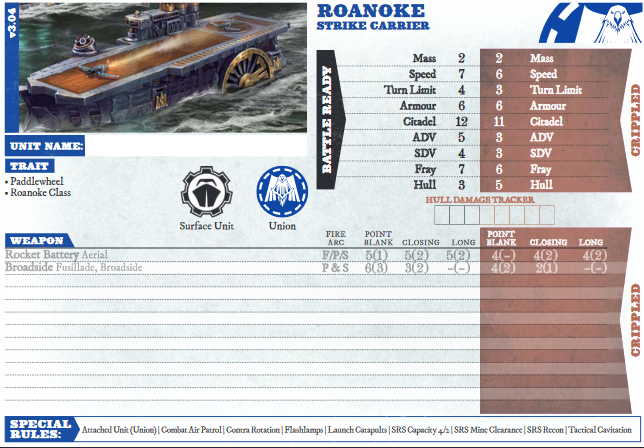
Example of the rules bloat. Above is the official unit card for a standard carrier. Below is my attempt to put all the unit specific rules for it on one page, though I ran out of room for the mostly universal special traits on the weapons. They definitely have sped up my play, and it feels painfully slow to watch an opponent flip through one set of sheets, find the name of a rule, cross reference it with another set of sheets, and then sometimes have to do that all over again because two different special rules are activating.
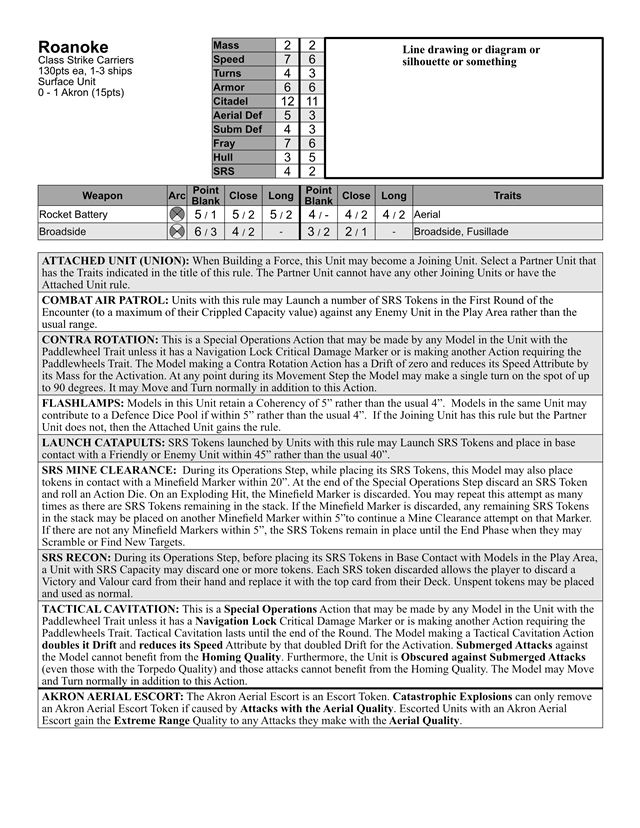
Terrain
DW3 has a weird relation with terrain. The rulebook is unclear about what a table should look like, and the publisher has never shown any of their own tables nor released a single battle report. Asking about tables and terrain on their forums elicits a chorus of "you aren't using enough terrain" responses, but the pics posted for the most part aren't that dense. And terrain gets blamed constantly for any kind of gameplay problems someone posts about.
But at the same time, the art and premise of the game is blue water capital combat, so it needing dense littoral tables feels wrong. I can see a case to be made for vastly different model and table scales, but not when there's ramming and boarding actions and template weapons.
Also aerial terrain is supposed to be a thing, but it's not discussed anywhere, merely alluded to, and basically no one uses it. The game has a lot of aerial units, many forces being able to field full flotillas. Which is doubly confusing because the sky being wide open almost never comes up as a complaint about terrain when the units behave exactly like boats in the sky. It's maddening.
Lack of publisher battle reports is becoming a real bugbear of mine.
Game Length
I have yet to get through a standard 2000pt sized game in under 4 hours (I've done 1500pts in 3.5). This can partially be attributed to our relaxed playstyle. But we spend an inordinate amount of time compared to other games (Dropzone/fleet, Heavy Gear, etc.) simply rolling and sorting and resolving dice in Dystopian Wars. It's not apparent directly in the rules why this is, but rather it emerges from play.
The current edition heavily favors mass formation alpha strikes over individual models. DW3 is an alternating unit activation system with no reactions, so it's possible to sink a target without it having any chance to fire back. In order to reliably sink targets, you need to create large dice pools to exceed tiered damage thresholds. Dice pools can only be made from similar weapons. Thus, the winning strategy that emerged here, and according to the forums everywhere else as well, is to run maximum sized homogeneous formations and always be lining up alpha strike attacks.
Effective alpha stikes are a major problem with every game I've ever found them in. It leads to degenerate min-maxing play styles, disfavors counterplay, and is an inherently boring strategy for both sides.
The comorbidity of massed formation alpha strikes in Dystopian Wars is that it uses huge dice pools. We're regularly seeing pools of ~40 dice. And theses aren't simple roll and count affairs. Rather the pool is a combination of many different stats and rules that all have to be looked up and checked for circumstances. And then you have to sort the dice by face (they're custom dice as well) and then reroll some of them, and then some more of the dice may be rerolled. But wait, we're not done, because usually the target has its own defensive dice pool with all the same baggage.
I haven't timed it yet, but it feels like we're spending 30% of play time just sorting dice.
A further knock-on effect of large formations is that a given game can have as few as six maneuver elements per side. With so few and a propensity for alpha strikes, it's common to lose control of an entire quarter of the table in one action. It feels like moving foot wide units of models around, which in turn makes it feel small and skirmishy.
Specific Rules: SRS, Submarauder, & 'Fortunes of War'
There's a few specific rules and mechanics I want to talk about.
'Short Range Squadrons'(SRS) are carrier launched fighters and bombers. They generally have a range of 40" give or take a bit from additional rules. They can usually be intercepted by friendly SRS, and they can perform other recce roles. Whoever brings the most, and not even in sheer number because some SRS are better than others, can completely cancel the opposition's power and the left over can run rampant. The carriers hide, and whoever loses one first is at a large disadvantage. Taking overwhelming amounts of SRS is a sadly effective strategy, but one that's mostly mitigated by a gentleman's agreement not to make obvious cheese lists and the other problematic rule.
Submarauder is an ability on many large ramming subs, like tentacled kaiju, drill nosed vessels, or giant robots. It allows a unit to appear on the table anywhere within a 20" diameter circle and attack a target. It's a surprise alpha strike rule. Hilariously, it also has an interaction with some scenarios where the unit can emerge from objective tokens, giving it a reach across most of the table, which is the most blatant pre-game list building advantage I've seen in a while.
The game has a deck of command cards that you can play to reroll a pool, +1 a stat, activate early (enabling alpha strikes), or be discarded to activate unit similar unit specific bonuses and abilities. 'Fortunes of War' is a rule on some flagships that lets you counterspell those abilities. Counterspells suck. It's an ability to make cool things not happen which is lame, or disable alpha strikes which is game changing. That only certain ships have it means they are often auto-includes, and any time there's an obvious choice like that in a game, something has gone wrong.
Is There Anything Good About It?
The models. Faction identity is loud and clear in the mechanics, and nicely asymmetric. The large roster of different models means few games feel entirely the same. It does a lot of things adequately and competently, but isn't superlative in any way I can really articulate. It mostly occupies a niche by its lonesome, one that I want to play in. It feels like there's a degree of system mastery to identify the interesting scenarios and force compositions, and you can't get there by aiming to win. I mean, I always prefer narrative scenarios to pickup/tournament style games, but the difference in my enjoyment here between the two is starker than usual.
In Summary
The game has written itself into a bit of a corner. It's starting to remind me of WHFB except without movement trays and the dice take longer to count. I think the designers see these problems as well, though they're reluctant to do major rewrites at present.
They have a relaunch of the Armored Clash line of land warfare coming out this year, and I suspect we'll see a preview of sorts of where Dystopian Wars 3.2 (or 4e?) is likely headed, and hopefully some easily backported ideas.
At the same time, I can also have fun playing a plodding naval game over four hours on a Sunday afternoon given good company, nice models, and just not doing the various unfun things in the game. So I'm going to figure out this blue hull conundrum of mine and crank out some ships and watch them shoot each other. But I'm also going to finish reading Sam Mustafa's Nimitz and write up a force org for the Union and Commonwealth.
Addendum
The core book scenarios are boring. They're mostly the same 'put everything on the board, now push them all together' affairs. There's various scenarios scattered between different books and they span the gamut or naff to fun. I highly recommend that once you've done a couple learning games, you skip straight to the following missions (and terrain rules) from the Admirals Tournament Organized Play booklet Warcradle published; Ambush, Dance with the Devil, Rescue, and Big Freeze. Edit I originally had Survey listed as well, but apparently we hallucinated a more interesting set of rules for the objectives, because on subsequent play, it's another boring set of VP decided turn 2 that have no bearing on the rest of the game.
